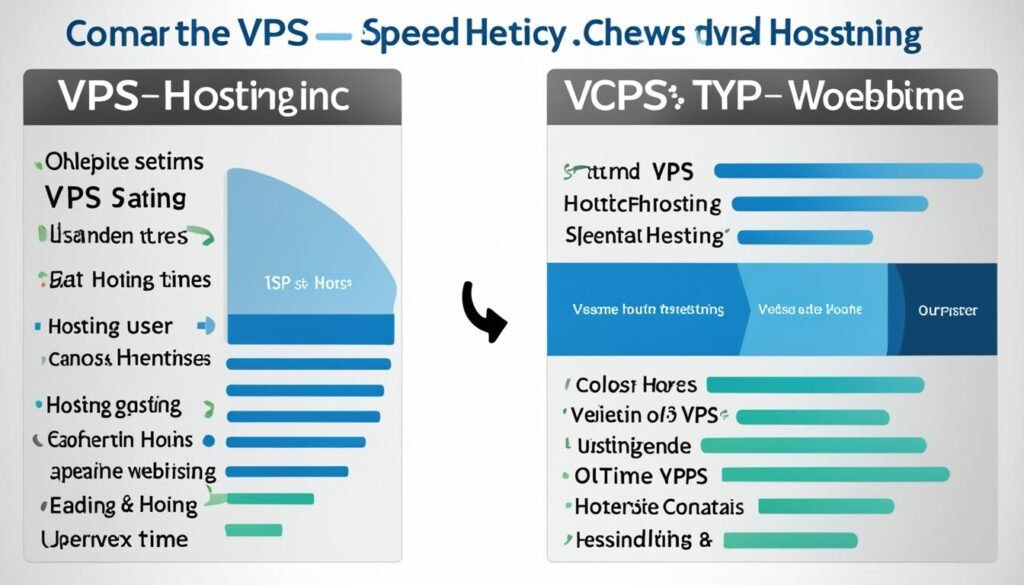VPS Hosting Or Shared Hosting When it comes to selecting a hosting plan for your website, the choice between VPS hosting and shared hosting is critical. VPS hosting and shared hosting are two popular types of hosting services offered by web hosts. They differ in terms of resource allocation, cost, performance, and scalability. Understanding the differences between these two types of hosting can help you make an informed decision and choose the right hosting plan for your needs.
Key Takeaways: VPS Hosting Or Shared Hosting
- VPS hosting provides dedicated resources and customization options, making it suitable for businesses or individuals who require more control and scalability.
- Shared hosting is more affordable and suitable for smaller websites with limited traffic and resource requirements.
- VPS hosting offers better performance, stability, and security compared to shared hosting.
- Shared hosting carries a higher risk of security breaches due to the shared server environment.
- VPS hosting grants you more control and customization options, while shared hosting has limited control and customization.
Understanding Shared Hosting
When it comes to choosing a hosting option for your website, shared hosting is a popular and cost-effective choice. In a shared hosting environment, multiple websites reside on a single server, sharing its resources such as CPU, disk space, and memory.
Imagine shared hosting as living in an apartment building. Each tenant has their own separate living space (website), but they all share common utilities and facilities (server resources). This shared hosting environment makes it the most affordable hosting option available, suitable for individuals or small businesses with limited budgets and minimal technical knowledge.
Shared hosting offers several features that make it an attractive choice for many website owners:
- Affordability: Shared hosting plans are typically more budget-friendly compared to other hosting options. It allows you to get your website up and running without breaking the bank.
- Convenience: Hosting providers manage the server’s technical aspects, such as maintenance, security, and software updates, so you don’t have to worry about the technical details.
- User-friendly: Shared hosting is designed to be user-friendly, making it ideal for beginners who have limited technical knowledge. You don’t need to have advanced technical skills or experience to set up and manage your website.
However, it’s important to note that shared hosting does have some limitations. Since resources are shared among multiple websites, performance can be slower, especially during peak traffic periods. Additionally, customization options may be limited due to the shared server environment.
Despite these limitations, shared hosting can still be a suitable choice for websites with lower traffic volumes and modest resource requirements. If you’re just starting your online presence or have a small website, shared hosting offers an affordable and convenient hosting solution.
Shared Hosting Features Comparison
| Shared Hosting Features | Description |
|---|---|
| Cost | Shared hosting is the most cost-effective hosting option available, making it ideal for individuals and small businesses on a tight budget. |
| User-friendliness | Shared hosting provides an easy-to-use interface and management tools, making it beginner-friendly and suitable for users with limited technical knowledge. |
| Resource Limitations | Shared hosting environments have limited resources due to the shared nature, which can result in slower performance during peak traffic periods. |
| Customization | While shared hosting offers some level of customization, it may have limitations compared to other hosting options. |
| Security | Shared hosting environments can carry a higher security risk due to the shared server environment and potential vulnerabilities of other websites on the same server. |
Despite its limitations, shared hosting is a reliable and affordable choice for many website owners. If you have a small website or are just starting out, shared hosting can provide you with a cost-effective hosting solution that meets your needs.
Exploring VPS Hosting
When it comes to hosting services, virtual private server (VPS) hosting stands out as a popular solution for businesses and individuals who require dedicated resources and advanced customization options. Unlike shared hosting, where resources are shared among multiple users on the same server, VPS hosting provides users with their own private virtual server environment.
VPS hosting offers a host of benefits, including dedicated resources and greater control over your hosting environment. With VPS hosting, you have the freedom to scale your resources as your website grows, ensuring optimal performance and stability. Additionally, you can install your own operating system and software, tailoring your hosting environment to suit your specific needs.
While VPS hosting generally requires more technical expertise and is slightly more expensive than shared hosting, the advantages make it a worthwhile investment for websites that require enhanced performance and security. Compared to shared hosting, VPS hosting provides better performance, stability, and security.
By choosing VPS hosting, you gain dedicated resources that are not shared with others, resulting in faster load times and improved overall website performance. This is especially beneficial for websites with high traffic volumes or resource-intensive applications.
“VPS hosting offers users their own dedicated resources and a private virtual server environment.”
VPS hosting also offers a higher level of security compared to shared hosting. In shared hosting, if one website on the server is compromised, it can potentially affect other websites as well. With VPS hosting, each website operates in its own isolated virtual environment, reducing the risk of security breaches and ensuring data privacy.
Furthermore, VPS hosting provides greater control and customization options. With shared hosting, the server settings are managed by the hosting provider, limiting your ability to customize and configure applications and software. In contrast, VPS hosting grants you root access to your server, giving you complete control over your hosting environment and allowing you to tailor it to meet your specific requirements.
With VPS hosting, you have the flexibility to upgrade your resources seamlessly as your website grows. Unlike shared hosting, where you may need to migrate to a new plan or provider, VPS hosting allows for easy resource upgrades, making it an ideal choice for websites with fluctuating resource requirements or those anticipating growth.
In summary, VPS hosting offers a hosting solution that combines the benefits of dedicated resources, customization options, scalability, and enhanced security. Although it may require more technical knowledge and comes at a slightly higher cost, the advantages of VPS hosting make it a preferred choice for businesses and individuals who value performance, stability, and control over their hosting environment.
Performance Comparison

When choosing a hosting option for your website, performance is a key factor to consider. The performance of a website can impact user experience, search engine rankings, and ultimately, the success of your online presence. In this section, we will compare the performance of shared hosting and VPS hosting, highlighting the key differences between the two.
Shared Hosting
Shared hosting is a popular and affordable hosting solution that allows multiple websites to share resources on the same server. While shared hosting plans are cost-effective and easy to set up, the shared nature of resources can affect performance, especially during high traffic periods.
With shared hosting, your website’s performance is influenced by the activities of other websites on the same server. If a neighboring website experiences a sudden spike in traffic or consumes excessive resources, it can impact the performance of your own website. This shared environment can lead to slower load times and decreased overall performance.
VPS Hosting
VPS hosting offers a more robust performance compared to shared hosting. In a VPS hosting environment, your website is hosted on a virtual private server that provides dedicated resources.
Unlike shared hosting, where resources are shared among multiple websites, VPS hosting ensures that your website has exclusive access to its allocated resources. This dedicated resource allocation results in better performance, faster load times, and improved overall website experience.
VPS hosting is recommended for websites that require high performance, such as e-commerce stores, business websites with a significant amount of traffic, or resource-intensive applications. With VPS hosting, websites have the advantage of dedicated resources to handle high traffic volumes and complex functionalities.
Let’s visualize the performance difference between shared hosting and VPS hosting.
Shared Hosting VPS Hosting Resource Allocation Shared Dedicated Performance May vary based on other websites’ activities Consistently high performance Load Times Slower during peak periods Fast and responsive Scalability Limited ability to handle sudden traffic spikes Easily scalable to accommodate increased traffic
As the table illustrates, VPS hosting offers dedicated resources and consistent high performance, while shared hosting can be affected by other websites’ activities and may experience slower load times during peak periods.
Considering the performance requirements of your website is crucial when deciding between shared hosting and VPS hosting. If your website receives significant traffic, requires fast load times, or runs resource-intensive applications, VPS hosting is the recommended choice for optimal performance and user experience.
Next, let’s explore the security considerations associated with shared hosting and VPS hosting.
Security Considerations

When it comes to choosing the right hosting solution for your website, security should be a top priority. In this section, we’ll explore the security considerations when comparing shared hosting and VPS hosting.
Shared Hosting: Potential Security Risks
Shared hosting is an economical choice for many website owners, but it may come with certain security risks. With shared hosting, multiple websites share the same server, which means that if one website is compromised, it can potentially affect others on the same server. This shared environment can make it easier for hackers to gain unauthorized access or exploit vulnerabilities.
“Shared hosting carries a higher risk of security breaches as multiple websites share the same server. One compromised website can potentially affect others.”
VPS Hosting: Enhanced Security Measures
On the other hand, VPS hosting offers enhanced security measures compared to shared hosting. With VPS hosting, each website operates within its own virtual environment, providing isolation and minimizing the risk of cross-contamination. This means that even if one website is compromised, it won’t affect the others on the same VPS server.
Furthermore, VPS hosting provides greater control over security configurations. You have the flexibility to implement specific security measures tailored to your website’s needs, such as firewall settings, secure file transfer protocols, and access restrictions. This level of control allows you to strengthen your website’s defenses and safeguard sensitive data.
“VPS hosting provides isolation, enhancing security by ensuring that each website operates in its own virtual environment. It offers greater control over security configurations, making it a more secure option.”
The Importance of Security
Whether you’re running an e-commerce store, handling customer data, or simply prioritizing the protection of your website and its content, security measures are crucial. From preventing unauthorized access to mitigating the risk of data breaches, investing in a secure hosting solution is essential to safeguard your online presence.
While shared hosting can be suitable for smaller websites with limited security requirements, VPS hosting is the recommended choice for websites that deal with sensitive data or require increased security measures. The additional security features and isolation offered by VPS hosting provide peace of mind and protect your website and its visitors.
| Security Considerations | Shared Hosting | VPS Hosting |
|---|---|---|
| Shared Environment | Multiple websites share the same server, increasing the risk of security breaches. | Each website operates in its own virtual environment, minimizing the risk of cross-contamination. |
| Control over Security Configurations | Limited control over security configurations as the server settings are managed by the hosting provider. | Greater control over security configurations, allowing customization according to specific website needs. |
Control and Customization

When it comes to choosing a hosting solution, having control over your hosting environment is essential. While shared hosting typically offers convenience and affordability, it may limit your ability to tailor the server settings to your specific needs. On the other hand, VPS hosting lets you customize and configure your hosting environment to optimize your website’s performance and meet your unique requirements.
With a shared hosting plan, the server settings and configurations are managed by the hosting provider. This means you have limited control over the environment in which your website operates. While shared hosting is a popular choice for small websites and individuals, it may not offer the level of control and flexibility required by businesses or individuals with specific technical requirements.
In contrast, VPS hosting allows you to have root access to your server, giving you complete control over your hosting environment. This means you can customize and configure applications, software, and server settings according to your preferences. Whether you need to install specific software or optimize server settings, VPS hosting provides you with the tools and capabilities to tailor your hosting environment to your exact specifications.
By using a shared hosting plan, you may find yourself limited by the predetermined configurations set by the hosting provider. However, with VPS hosting, you have the freedom to select and install the specific software and applications that best suit your needs. This level of customization allows you to optimize your website’s performance and ensure it operates at its full potential.
Benefits of Hosting Control and Customization
- Optimized Performance: With control over your hosting environment, you can fine-tune your server settings to achieve optimal performance for your website.
- Flexible Software Installation: VPS hosting allows you to install and configure specific software, enabling you to run applications that are crucial for your website’s functionality.
- Enhanced Security: By customizing your hosting environment, you can implement security measures that are best suited for your website’s needs, mitigating potential risks.
- Better Resource Management: Tailoring your hosting environment enables efficient resource allocation, ensuring your website has the necessary resources to handle varying levels of traffic and demand.
Scalability and Resource Upgrades

When it comes to the scalability of your website, upgrading to VPS hosting provides more flexibility and ease compared to shared hosting. As your website grows and requires more resources, VPS hosting allows for seamless resource upgrades without the need to migrate to a new plan or provider, saving you time and effort.
Shared hosting is a popular option for individuals or small businesses with limited budgets and minimal technical knowledge. However, as your website traffic increases and resource demands grow, shared hosting may not be able to keep up with the increased load, resulting in slower performance and potential downtime.
On the other hand, VPS hosting offers dedicated resources, providing better scalability and improved performance. With VPS hosting, you have the freedom to allocate more CPU, disk space, and memory resources to meet the needs of your growing website. As your business expands, you can easily upgrade resources such as RAM and storage without any hassle.
Here’s a comparison between shared hosting and VPS hosting in terms of scalability and resource upgrades:
| Shared Hosting | VPS Hosting |
|---|---|
| Limited scalability due to shared environment | Flexible scalability with dedicated resources |
| Potential need to migrate to a new plan or provider | Seamless resource upgrades without migration |
| Risk of slower performance as traffic increases | Better performance and load times |
As you can see, VPS hosting provides a scalable solution that grows with your website. The dedicated resources ensure consistent performance, even during high traffic periods. Additionally, the ability to easily upgrade resources allows you to adapt to changing demands without any disruptions.
Upgrade to VPS hosting
and unlock the potential for growth with a hosting environment that can accommodate your expanding website needs. Whether you’re currently using shared hosting or considering starting with VPS hosting from the beginning, making the switch will ensure your website can scale effortlessly.
Next Steps: Choosing the Right Hosting Plan
After understanding the scalability and resource upgrade options, it’s important to evaluate your website’s specific requirements and choose the hosting plan that best suits your needs. Consider factors such as anticipated growth, budget, and technical expertise before making a decision.
In the next section, we’ll explore the cost comparison between shared hosting and VPS hosting, helping you make an informed choice for your website’s hosting solution.
Cost Comparison

When it comes to choosing a hosting provider, cost is an important factor to consider. Shared hosting plans typically have a lower price point compared to VPS hosting, making them the cheapest option for hosting your website.
Shared hosting providers offer affordable plans that cater to individuals and small businesses with limited budgets. These plans start at a budget-friendly price, providing a cost-effective solution for hosting your website.
VPS hosting, on the other hand, offers more control and comes with dedicated resources, which make it slightly more expensive. With VPS hosting, you have the ability to customize your hosting environment and enjoy the benefits of a virtual private server. The additional features and enhanced performance that VPS hosting provides come at a higher price compared to shared hosting.
It’s important to consider your specific website needs and budget when deciding between shared hosting and VPS hosting. If you have a small website with limited traffic and resource requirements, shared hosting is the most cost-effective choice. However, if you require more control over your hosting environment and dedicated resources, VPS hosting may be worth the additional cost.
Take a look at the table below for a comprehensive comparison of shared hosting and VPS hosting:
| Hosting Type | Cost | Control | Resources |
|---|---|---|---|
| Shared Hosting | Cheapest | Limited | Shared |
| VPS Hosting | Slightly more expensive | More control | Dedicated |
As the table demonstrates, shared hosting is the most affordable option, with cost being its primary advantage. However, if you value control over your hosting environment and dedicated resources, VPS hosting offers the necessary features at a slightly higher cost.
When choosing the right type of hosting plan for your website, you’ll encounter various options such as shared hosting, VPS hosting, and dedicated hosting. Shared hosting, which involves sharing a server with multiple users, is a budget-friendly hosting solution suitable for small websites with moderate traffic. In contrast, VPS hosting provides more dedicated resources by partitioning a physical server into multiple virtual servers, offering greater control and scalability than shared hosting. Dedicated hosting, on the other hand, provides exclusive use of an entire server, making it ideal for large websites with high traffic volumes. While shared hosting is less expensive than VPS hosting, VPS hosting offers more flexibility and performance compared to shared hosting. Many hosting providers offer both shared hosting and VPS hosting plans, allowing users to upgrade to a VPS as their website grows. Managed VPS hosting is also available, providing technical support and server management services to users. Ultimately, the best hosting solution depends on your website’s specific needs and budget, so it’s essential to carefully compare shared hosting vs. VPS hosting to make an informed decision for your hosting account.
When choosing between shared vs. VPS hosting, it’s crucial to select the right hosting package for your website’s needs. Unlike shared hosting, which involves sharing resources on a server with other users, VPS hosting provides more control over your hosting environment by allocating dedicated resources. While shared hosting is the most affordable option and a popular choice for many websites due to its cost-effectiveness, VPS hosting offers greater customization and performance benefits. Shared hosting plans typically start with a lower cost, making them suitable for beginners or small websites with limited traffic, whereas VPS hosting allows for scalability and flexibility as your website grows. Whether you’re considering upgrading from shared hosting to VPS hosting or choosing between shared or VPS hosting initially, it’s essential to understand the differences between the two types of hosting services and the features of each hosting type offered by various hosting companies. Ultimately, the best hosting option depends on your website’s specific requirements and the level of control you need over your hosting environment, so it’s essential to carefully evaluate the benefits and drawbacks of shared and virtual private server hosting before making a decision.
Also Read: The Benefits Of Choosing VPS Hosting For Your Website
Conclusion
When it comes to choosing the right hosting for your website, it’s important to consider your specific requirements, budget, and scalability needs. Shared hosting is an excellent option for small websites with limited budgets as it offers affordability and easy setup. However, if you require more control, customization, and scalability, VPS hosting is the best hosting solution for your website.
VPS hosting provides dedicated resources and advanced technical capabilities, making it ideal for businesses or individuals who need more control over their hosting environment. With VPS hosting, you have the flexibility to customize your server settings, install specific software, and scale your resources as your website grows. While VPS hosting may be slightly more expensive than shared hosting, the benefits of dedicated resources make it a worthwhile investment.
Consider the needs of your website and the level of control and scalability you require. If you have a small website with limited traffic and a tight budget, shared hosting may be the most suitable option. However, if your website requires more resources, customization, and growth potential, VPS hosting is the best hosting option for you. Choose the hosting solution that aligns with your website’s needs and unlocks its full potential.
FAQs
Q: What is the difference between VPS hosting and shared hosting?
A: VPS hosting (Virtual Private Server) provides a dedicated virtual environment with more resources and flexibility, while shared hosting involves sharing resources with other websites on the same server.
Q: When should I choose VPS hosting over shared hosting?
A: You should consider VPS hosting if you require more control, customization, and resources for your website, compared to the limitations of shared hosting.
Q: How does shared hosting compare to VPS hosting in terms of performance?
A: VPS hosting typically offers better performance since resources are not shared with other websites, unlike shared hosting where performance can be affected by other sites on the same server.
Q: What are the key features of VPS hosting plans?
A: VPS hosting plans usually include dedicated resources, root access, scalability, choice of operating system, and the ability to install custom software.
Q: Can I upgrade from shared hosting to a VPS hosting plan?
A: Yes, many hosting providers offer the option to upgrade from a shared hosting plan to a VPS hosting plan to accommodate your website’s growing needs.
Q: Which hosting type is more suitable for high traffic websites, VPS hosting or shared hosting?
A: VPS hosting is generally more suitable for high traffic websites as it provides dedicated resources and better scalability compared to shared hosting.
Q: What are the differences between shared hosting and VPS hosting in terms of security?
A: VPS hosting offers better security as it operates in an isolated environment, while shared hosting can pose risks due to sharing resources with other websites.




